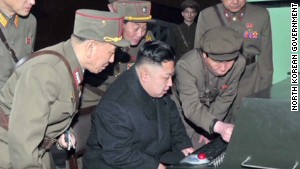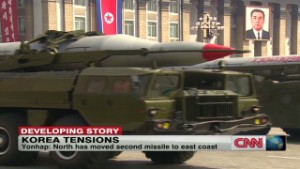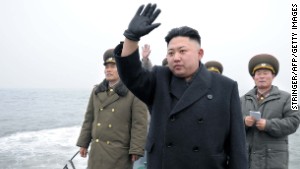마지막 '남북 완충지대' 개성공단 멈췄다
 7
7
 0
0
 0
조회 101
2013.04.09 03:48
0
조회 101
2013.04.09 03:48
ㆍ북, 가동 잠정중단 선언… “북 근로자 전부 철수”
ㆍ정부 “매우 유감… 모든 책임 북한 당국이 져야”
북한이 8일 개성공업지구 근로자를 전부 철수하고 사업을 ‘잠정 중단’하겠다고 밝혔다. 최종적 폐쇄 선언 가능성도 시사했다. 남북협력의 상징인 개성공단이 2003년 착공식을 갖고 첫 삽을 뜬 지 10년 만에 처음으로 조업 중단을 선언하면서 최대 위기를 맞게 된 것이다. 최종 폐쇄로 이어져 남북 간 마지막 연결고리마저 끊어질 경우 한반도 충돌 위기는 더욱 고조될 것으로 전망된다.(경향신문 1면 헤드라인, 이하생략)
<단지언니생각>
1)박근혜와 박근혜 정부는 모든 책임을 북한 당국이 져야 한다고 하며 정치적 강변과 발뺌에만 전전긍긍 하고 있으며
2)전쟁이 나는데 무슨 책임을 지라고 하는지?
3)북한 정부는 너무 강하고 남한 정부는 너무 무책임하고 약하고
4)한민족의 민족성, 남한의 국민성, 정치판이 모두 동일한 수준으로
5)분단이후 가장 위험한 수위로 한반도에 전운(戰雲, war clouds)이 감돌고 있다고 하는데
6)남북간 긴장완화 유화정책을 쓰다가 수년전에 억울하게 가신 님들은 아무 말씀이 없으며
7)살아있는 사람들은 저마다 자기가 잘낫다고 말들만 무성하니
8)이러다가 정말 최악의 상황으로 간다면 민족이 멸종하는 길이 되지 않을까?
9)눈물이 납니다. 이제 태어난 갓난 아이들이 무슨 죄가 있기에.....
>>아래, cnn한반도 긴장상태 관련기사 참고.
An accident, then war with North Korea?
- Wesley Clark: What if war is triggered by accident or some kind of miscalculation?
- Clark: The recent bellicose rhetoric from North Korea raises the possibility
- However, North Korea has a history of using extreme words to scare opponents
- Clark: The U.S. and South Korean deterrent remains strong; odds are there won't be war
Editor's note: Wesley K. Clark, a retired Army general and NATO's former supreme allied commander in Europe, is a senior fellow at the Burkle Center for International Relations at the University of California, Los Angeles. Clark consults and advises companies in the satellite communications, biotechnology and energy fields, some with government and Department of Defense contracts.
(CNN) -- What if war is triggered by accident or some kind of miscalculation on the Korean peninsula?
This is a possibility that has provoked worry, analysis and preparations for more than 50 years. The recent bellicose rhetoric from the young, unproven leader of North Korea raises this possibility to a new height. What precisely is the risk, and what should be done about it?
The angry rhetoric of Kim Jong Un has set a record for extremism. And yet, going all the way back to the negotiating tactics used in the Korean War, the North has used an extreme, abusive and contradictory style.

Anything conceded to them was taken, but they conceded nothing. Anything up for negotiation was met with ever heightening demands. Every offer of compromise was met with an angry rhetoric of denial. Repeated rounds or negotiations over the succeeding decades have seen little change. And their public rhetoric has always been harsh and hyperbolic.
Opinion: North Korea is far from suicidal
But it hasn't been only rhetoric over the years. In the 1960s, U.S. soldiers serving in Korea were authorized to wear their division's insignia on the right shoulder, the so-called combat patch. A U.S. Navy ship was attacked, boarded and seized with its crew held captive in 1968. A U.S. Army major and another soldier were beaten to death in the Korean Demilitarized Zone in 1976.
Again and again, North Korea has defied international accords, laws and common sense, creating and exporting long-range missiles, building nuclear capabilities and engaging in kidnappings, sabotage and cyberattack.
But there has been no war.
We attribute this to three factors. First, we believe the overwhelming power of the United States guarantees that any North Korean attack would, eventually, result in the utter destruction of the regime. Second, the South Korean leadership has shown remarkable restraint in the face of humiliating North Korean provocations. Third, the North Koreans may not have ever intended to attack, though we have no way of knowing, or they understand that the combined U.S.-South Korean forces would destroy North Korea should war begin.
The U.S. and South Korean deterrent remains strong -- in both rhetoric and deployable, effective military power.
But what about miscalculation?
Yes, it is always possible that Kim may doubt that the United States would act, despite all the evidence to the contrary. Or, perhaps he miscalculates how far he can push the South Koreans. It is possible that a North provocation could be so extreme that the South would be compelled by its own domestic politics to respond militarily -- say a tit-for-tat ship-sinking. Or maybe such an incident occurs by accident, if overzealous commanders make a wrong move.
Opinion: Does North Korea think U.S. going soft?
And then Kim, fearing that his own associates would mistake forbearance for weakness, would escalate in turn, thus initiating a cycle of intensifying moves that could spread conflict and turn into a war that neither side could back away from.
The risk is higher now than before because Kim's bellicose rhetoric may mask real weaknesses in his authority or in his understanding.
The rising rhetoric raises tensions (as it is probably designed to do). These tensions increase the risks of fear or pride, which could lead to an inadvertent incident. Should an incident occur, there will be pressure on leaders of both sides to retaliate and even escalate hostility. The consequences of conflict are higher than before, given the North's nuclear and missile capabilities.
What should be done?
First, ensure that the U.S. deterrent is capable and credible. This requires that we have the capability to both defend ourselves and strike back, and that we make it as clear as possible to the North Koreans our resolve to use these capabilities if challenged.
Second, assure our South Korean allies that we will stand with them, so they can afford politically to be restrained.
Third, strike a balance between demonstrating resolve in public and, simultaneously, working to reduce tensions. North Korea must always be given an "out" from the box of escalating threats it has constructed, but the out must not involve U.S.-South Korean concessions, apologies or any signs of hesitancy, weakness or lack of resolve. This requires artful balancing of military demonstrations, deployments, statements and behind-the-scenes dialogue with China and others in the region.
Opinion: Kim Jong Un is not crazy
The odds are that there will be no conflict. Good odds. The U.S. and South Korean leadership is experienced. And so are those behind the young leader in the North. This is a familiar game, but one whose risks far outweigh any actual benefits to the North.
Why is the world fascinated by North Korea?
Follow us on Twitter: @CNNOpinion.
Join us at Facebook/CNNOpinion.
The opinions expressed in this commentary are solely those of Wesley Clark.
- 소셜댓글 개
 끊은단지 1950ljt
끊은단지 1950ljt















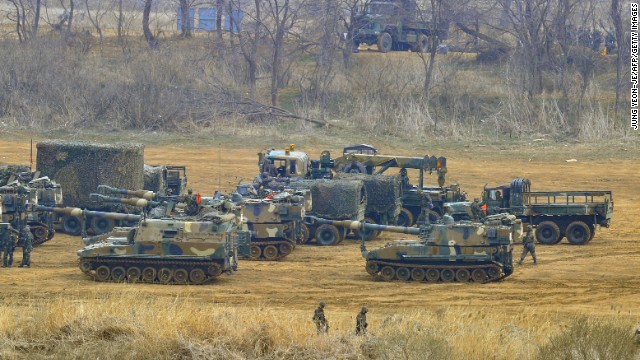 South Korean soldiers with K-55 self-propelled Howitzers stage at a military training field in the border city of Paju on Friday, April 5, as tensions continue to mount on the Korean peninsula.
South Korean soldiers with K-55 self-propelled Howitzers stage at a military training field in the border city of Paju on Friday, April 5, as tensions continue to mount on the Korean peninsula.
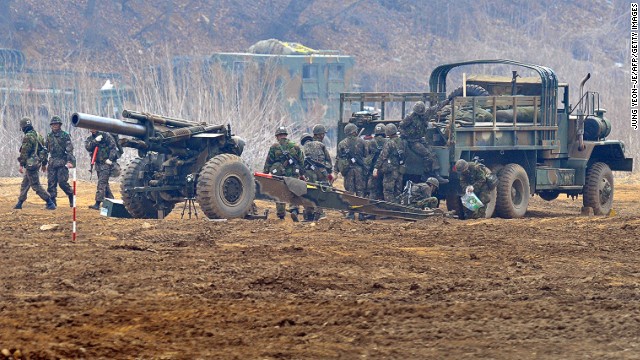 South Korean soldiers man a cannon at a military training field in Paju on April 5.
South Korean soldiers man a cannon at a military training field in Paju on April 5.
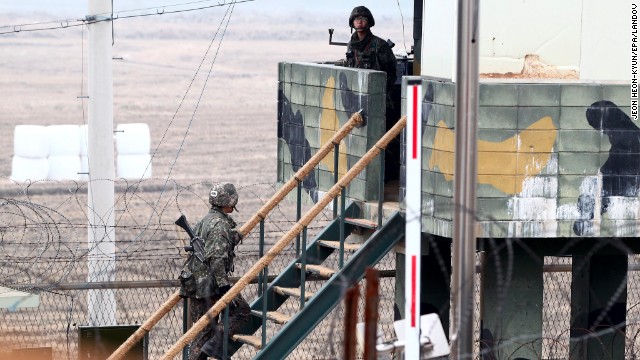 South Korean soldiers stand guard at a sentry post at the border with North Korea in the Demilitarized Zone near Imjingak, South Korea, on April 5.
South Korean soldiers stand guard at a sentry post at the border with North Korea in the Demilitarized Zone near Imjingak, South Korea, on April 5.
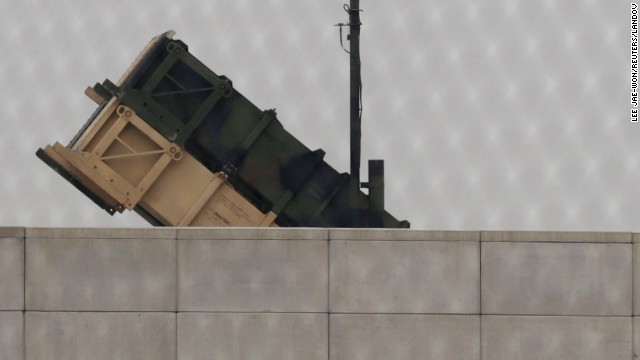 A U.S. Army Patriot missile battery is visible at the U.S. Osan Air Base in South Korea on Friday, April 5.
A U.S. Army Patriot missile battery is visible at the U.S. Osan Air Base in South Korea on Friday, April 5.
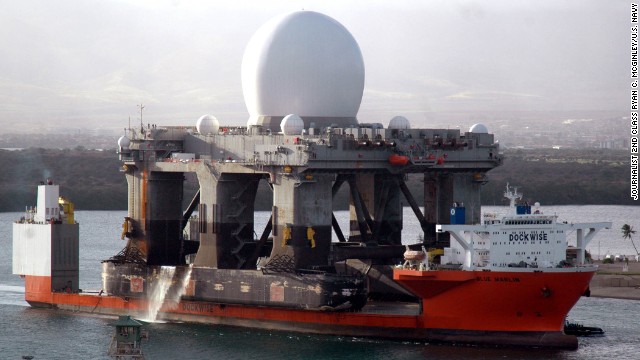 The U.S. Navy is moving a sea-based radar platform, like the one seen in this 2006 file photo, closer to the North Korean coast to monitor that country's military moves, including possible new missile launches, a Defense Department official said Monday, April 1.
The U.S. Navy is moving a sea-based radar platform, like the one seen in this 2006 file photo, closer to the North Korean coast to monitor that country's military moves, including possible new missile launches, a Defense Department official said Monday, April 1.
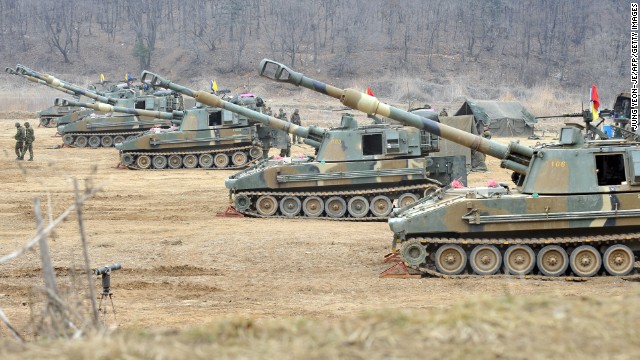 South Korean marines man K-55 self-propelled Howitzers at a military training field in the border city of Paju on Monday, April 1. Park Geun-hye, South Korea's new president, promised a strong military response to any North Korean provocation after North Korea announced that the two countries were in a state of war.
South Korean marines man K-55 self-propelled Howitzers at a military training field in the border city of Paju on Monday, April 1. Park Geun-hye, South Korea's new president, promised a strong military response to any North Korean provocation after North Korea announced that the two countries were in a state of war.
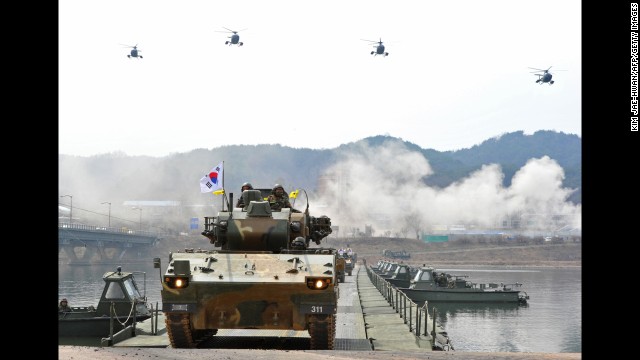 South Korean anti-aircraft armored vehicles move across a temporary bridge during a river crossing drill in Hwacheon near the North Korean border on Monday, April 1.
South Korean anti-aircraft armored vehicles move across a temporary bridge during a river crossing drill in Hwacheon near the North Korean border on Monday, April 1.
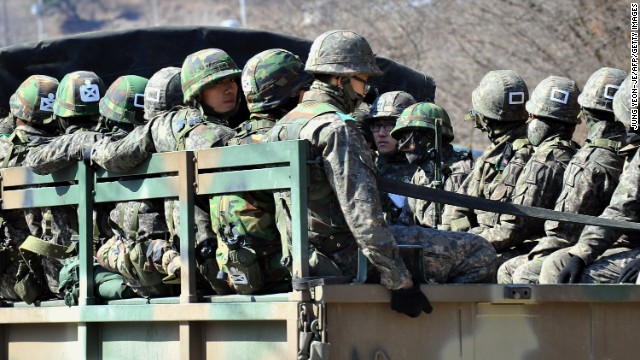 South Korean soldiers ride on a military truck in Paju on Friday, March 29.
South Korean soldiers ride on a military truck in Paju on Friday, March 29.
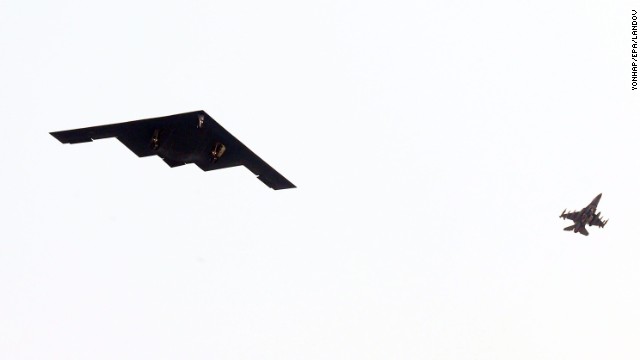 The United States said Thursday, March 28, that it flew stealth bombers over South Korea to participate in annual military exercises amid spiking tensions with North Korea. Pictured, a B-2 Spirit stealth bomber flies over South Korea's western port city of Pyeongtaek.
The United States said Thursday, March 28, that it flew stealth bombers over South Korea to participate in annual military exercises amid spiking tensions with North Korea. Pictured, a B-2 Spirit stealth bomber flies over South Korea's western port city of Pyeongtaek.
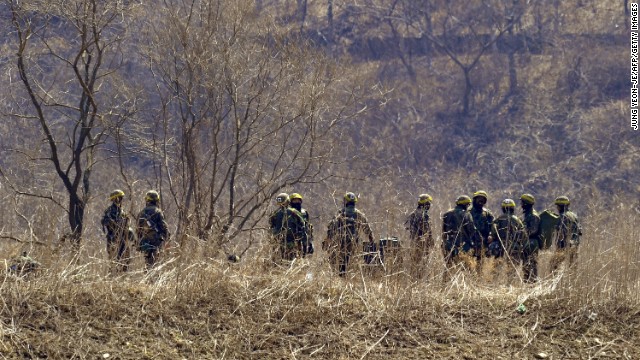 South Korean soldiers gather at the foot of a mountain near a military drill field in the border city of Paju on Wednesday, March 27.
South Korean soldiers gather at the foot of a mountain near a military drill field in the border city of Paju on Wednesday, March 27.
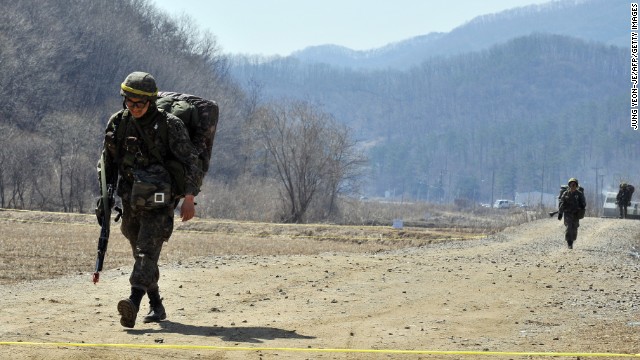 Armed South Korean soldiers walk on a road near a military drill field in Paju on March 27.
Armed South Korean soldiers walk on a road near a military drill field in Paju on March 27.
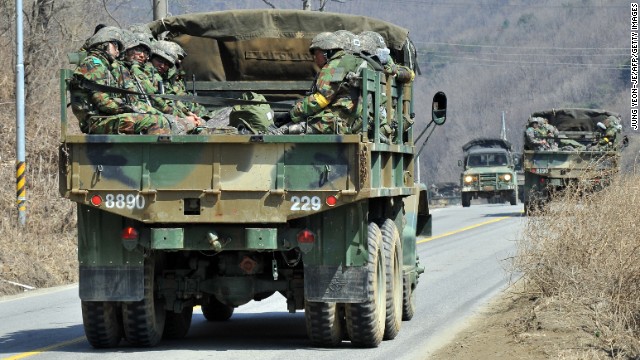 South Korean soldiers ride in a military truck in Paju on March 27.
South Korean soldiers ride in a military truck in Paju on March 27.
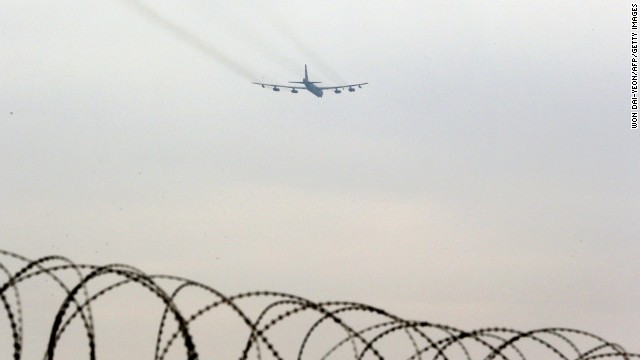 A B-52 bomber flies over the wire-topped fence of a U.S. air base in Osan, South Korea, on Tuesday, March 19.
A B-52 bomber flies over the wire-topped fence of a U.S. air base in Osan, South Korea, on Tuesday, March 19.
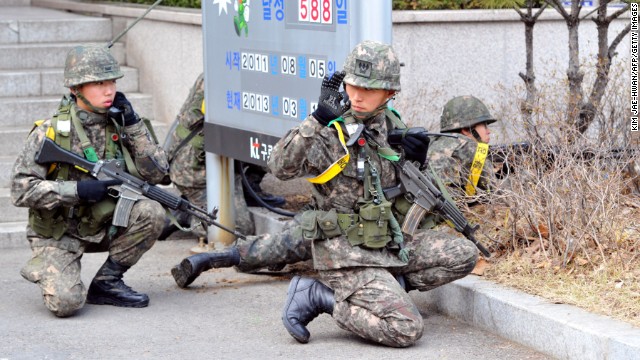 South Korean soldiers take part in a drill to guard the building of a state-run telecom company in Seoul against potential guerrilla attacks on Thursday, March 14.
South Korean soldiers take part in a drill to guard the building of a state-run telecom company in Seoul against potential guerrilla attacks on Thursday, March 14.
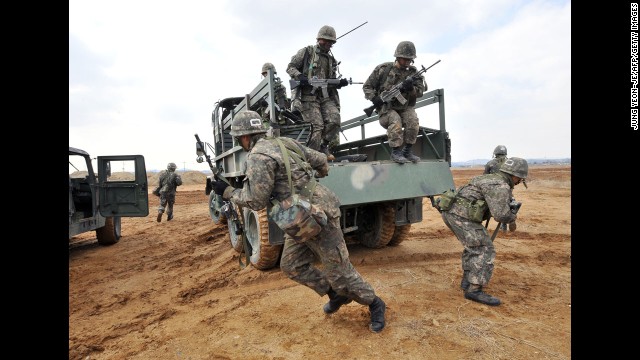 South Korean army soldiers jump off a military truck during a drill outside a U.S. airbase in Pyeongtaek as part of annual joint exercises with the United States on March 14.
South Korean army soldiers jump off a military truck during a drill outside a U.S. airbase in Pyeongtaek as part of annual joint exercises with the United States on March 14.
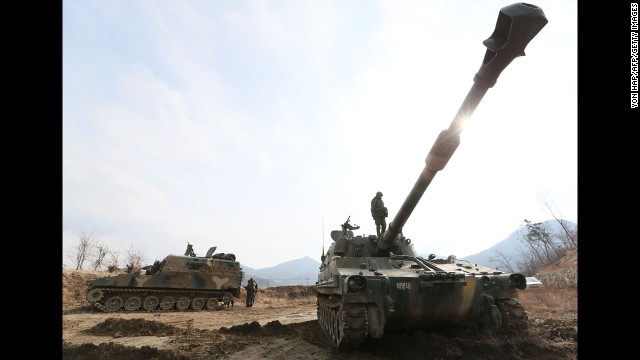 South Korean Marines operate K-55 self-propelled howitzers on the western island of Ganghwa near the disputed maritime frontier with North Korea on Wednesday, March 13.
South Korean Marines operate K-55 self-propelled howitzers on the western island of Ganghwa near the disputed maritime frontier with North Korea on Wednesday, March 13.
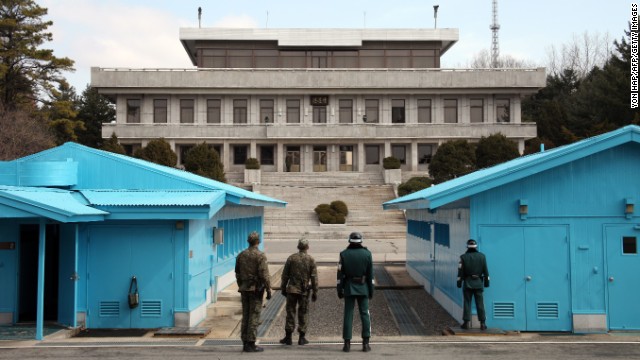 South Korean soldiers stand guard as a North Korean soldier, far center, looks on at the truce village of Panmu**** in the demilitarized zone dividing the two Koreas on March 13.
South Korean soldiers stand guard as a North Korean soldier, far center, looks on at the truce village of Panmu**** in the demilitarized zone dividing the two Koreas on March 13.
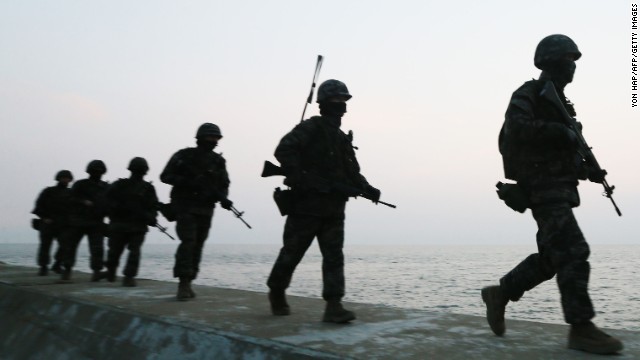 South Korean marines patrol on the South Korea-controlled island of **onpyeong near the disputed waters of the Yellow Sea on Tuesday, March 12.
South Korean marines patrol on the South Korea-controlled island of **onpyeong near the disputed waters of the Yellow Sea on Tuesday, March 12.
 In this Navy handout image taken on March 5, Lt. j.g. Matthew Harmon serves as helm safety officer aboard the guided-missile destroyer USS McCampbell during a replenishment at sea, part of Foal Eagle 2013, the joint exercises between the United States and South Korea.
In this Navy handout image taken on March 5, Lt. j.g. Matthew Harmon serves as helm safety officer aboard the guided-missile destroyer USS McCampbell during a replenishment at sea, part of Foal Eagle 2013, the joint exercises between the United States and South Korea.
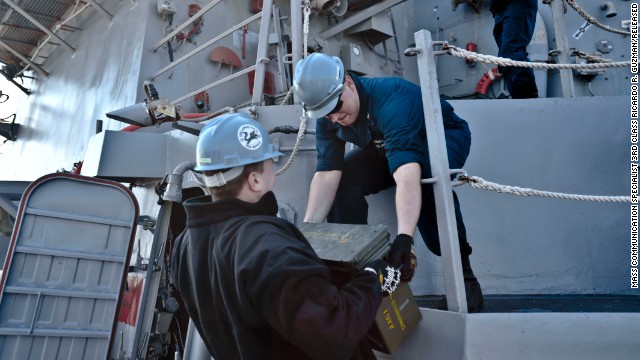 Fire Controlman 2nd Class Jason Titcombe, left, hands Fire Controlman 2nd Class Joshua Clements ordnance aboard the destroyer USS Lassen in this Navy handout photo taken on March 5.
Fire Controlman 2nd Class Jason Titcombe, left, hands Fire Controlman 2nd Class Joshua Clements ordnance aboard the destroyer USS Lassen in this Navy handout photo taken on March 5.
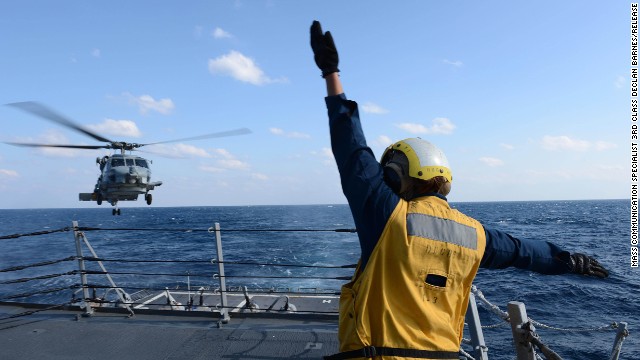 U.S. Navy Boatswain's Mate 3rd Class Brittany Chiles signals to an SH-60B Seahawk helicopter as it lands on the flight deck of the destroyer USS McCampbell on March 4 in the Pacific Ocean, in this Navy handout photo.
U.S. Navy Boatswain's Mate 3rd Class Brittany Chiles signals to an SH-60B Seahawk helicopter as it lands on the flight deck of the destroyer USS McCampbell on March 4 in the Pacific Ocean, in this Navy handout photo.
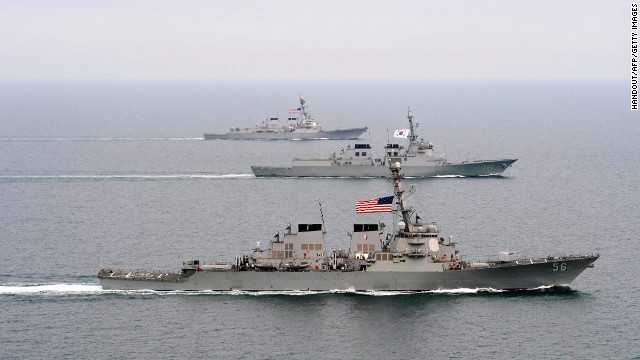 This March 17 Navy handout image shows the destroyer USS John S. McCain, front; the Republic of Korea Navy destroyer ROKS Seoae-Yu-Seong-Ryong, center; and the destroyer USS McCampbell moving into formation in the waters off the Korean Peninsula during exercise Foal Eagle 2013.
This March 17 Navy handout image shows the destroyer USS John S. McCain, front; the Republic of Korea Navy destroyer ROKS Seoae-Yu-Seong-Ryong, center; and the destroyer USS McCampbell moving into formation in the waters off the Korean Peninsula during exercise Foal Eagle 2013.






















